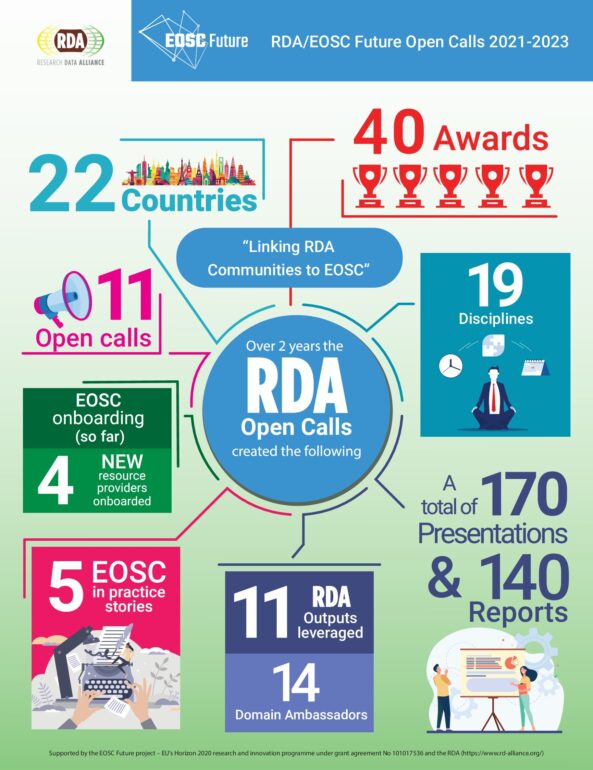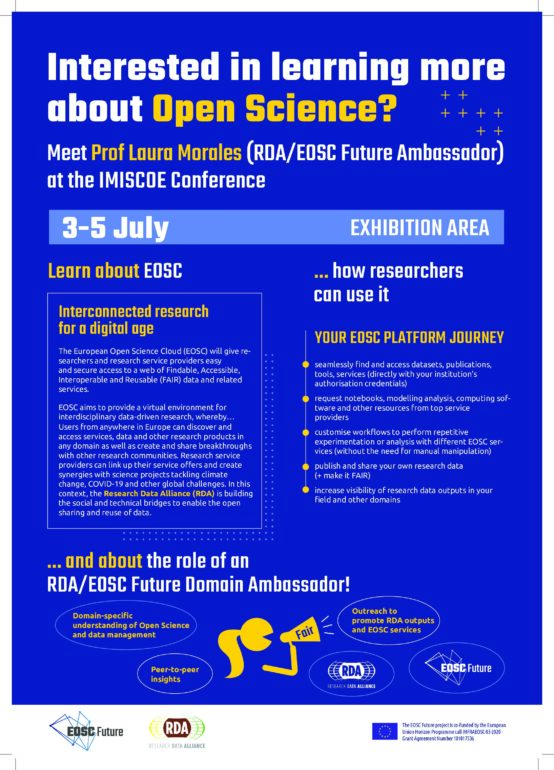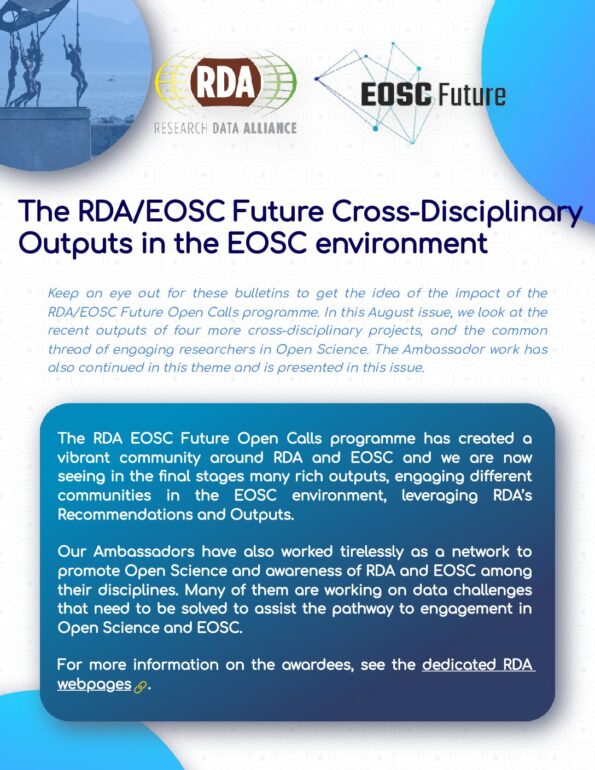The Research Data Alliance (RDA) is a community-driven international initiative facilitating the open sharing and re-use of research data. In partnership with the EOSC Future project, RDA launched a series of open calls aiming to raise awareness of EOSC assets and RDA standards and outputs across a diverse range of research communities. Leveraging RDA’s global connections, the project advocated for and supported FAIR principles and Open Science by engaging science and research communities beyond the EOSC Future consortium.
Around €1 million across 40 grants
With a substantial budget of almost €1 million, over 40 grants were awarded to projects through the RDA/EOSC Future open calls scheme to get a wide range of scientific communities involved with EOSC. Focused on early adoption, technical and domain solution development, and interoperability, the selected projects contributed to the advancement of research data tools, standards, and expertise within the EOSC framework. The grants also facilitated participation in events bridging the RDA and EOSC communities.
Below is a list of the results of the calls. Find out more about the selected projects: their objectives in the scope of EOSC Future and their results so far…

Optimising (RDA) Open Science Frameworks and Guidelines in the context of EOSC (2 rounds)
This call invited applications from research groups, including the RDA groups, to demonstrate how RDA-developed data sharing concepts and solutions can be reused, optimised and implemented in the EOSC context, particularly in the context of the EOSC Portal Catalogue and Marketplace.
EOSC Interoperability Framework contributions
This call sought European consortiums or interdisciplinary groups to validate and demonstrate the value of EOSC Interoperability Framework.
Call for RDA 20 Plenary support
The Research Data Alliance and the EOSC Future project published this call to support the hosting of the RDA 20 Plenary Conference in March 2023, to coincide with the 10th Anniversary of RDA, as well as the Swedish EU Presidency.
Cross-disciplinary science adoption (2 rounds)
This call invited research groups from different or across disciplines who wish to share their data, have it combined with other data and make it more visible by using the services of the EOSC portal. Work under this call was to improve the understanding of the requirements per discipline with regards to cross-disciplinary FAIR data sharing and (re)use, by leveraging RDA standards, outputs and recommendations.
RDA / EOSC Future Domain Ambassadors (2 rounds)
This second Open Call for EOSC Future Domain Ambassadors offered up to €10.000,00 per grant to domain experts and skilled communicators to promote data sharing and open science practices in their disciplines
RDA Communities of Practice
This call iteration specifically targeted individuals or groups looking to establish RDA Communities of Practice in support of EOSC. The call complemented the activities of RDA in supporting the engagement of underrepresented scientific and research communities in EOSC Future.
RDA Working Groups
Calls focused on RDA Working Groups for the development of EOSC solutions. This call sought to fast-track, high-quality EOSC solutions with technical documentation and maintenance plans.
Science communication on RDA/EOSC Future open calls
This call sought applications from a science communication professional to deliver one series of excellent quality, high-impact articles which showcase the results and outcomes of a selection of the EOSC Future/RDA open calls programme.
Meet the grantees selected under each of the above-listed open calls here.
Discover RDA/EOSC Future open call project outputs
Standards, tools and services: Empowering researchers
The Open Calls yielded tools and recommendations promoting data sharing in the EOSC environment. A selection of awarded projects includes:
- Machine actionable data and software management plans
- Integration of DataCite PID into a lab notebook solution
- Registry services for controlled vocabularies
- Transformation of messy data into structured data
- FAIR enabling cross-domain citation model in Cultural Heritage
- Working with PIDs in Tools IG supported by open call projects
These projects not only contribute to EOSC but also encourage Open Science practices.
Rewarding and teaching Open Science practices
FAIR principles serve as a key starting point, with RDA demonstrating the benefits of higher maturity levels. Projects integrating RDA outputs into their methods streamline resources for EOSC, fostering early-stage data sharing practices. Examples include:
- RDA FAIR indicators in Biology
- FAIRification for psychology repositories
- Recommendations for cross-disciplinary data sharing in the Wind Energy Community
- Data science skills training
- NeuroImaging RDA WG and Psychology RDA Interest Group promoting Open Science practices
Disciplinary Communities: The Future of EOSC Engagement Strategy
As an outcome of the RDA/EOSC Future open calls scheme, Domain Ambassadors were appointed to facilitate engagement. These experts provide valuable insights into data sharing, RDA adoption, dissemination efforts, and promotion of Open Science in their communities. The result is regular feedback and promotion of EOSC, making it relevant to new audiences through onboarded resources and providers.
A total of 14 Domain Ambassadors were selected. They helped to bridge disciplinary community needs and awareness of EOSC with domain insights, ultimately supporting communities in engaging with Open Science practices.
You can also find blogs from ambassadors here.
Reaching out across disciplines
Within and across disciplines, the RDA/EOSC Future open calls programme supported exchanges. Get insights on RDA/ESC Future Cross-disciplinary Outputs in the EOSC Environment: Third Bulletin (below).
Fresh off the press: Grantees in the news
Throughout the project, RDA/EOSC Future grantees and project partners were vocal about their work and achievements. Some of these are featured in a series of Science|Business articles. Others were the focus of different types of events.

Domain Ambassadors at the RDA Plenary
Connecting EOSC with the Global Research Commons
EOSC Future collaborated with the Global Open Research Commons (GORC) International Model RDA Working Group, at the time in the final stages of developing a roadmap for the global alignment of priorities around the coordination of setting up international science commons. This included collaboration with the broader GORC Interest Group providing a neutral arena for discussing Open Research Commons.
As a result of this collaboration, the EOSC Future technical team was invited to contribute to the GORC final review of its attribute model v0.6, released as a draft in July 2023. In September 2023, consultation workshops were held providing an opportunity for EOSC Future to comment on certain elements in the framework and to influence the model, transferring European EOSC technical components into practices on the international scene.
The EOSC Future project also submitted a proposal for a ”Birds of a feather” (BoF) session during the Salzburg RDA Plenary in October 2023, with the goal to create an RDA Ambassadors group to further strengthen the sustainability of the community.
Read more about ‘Galvanising The Commons – Building Global Bridges For Commons And Disciplines‘, the post-event article from P20 event.
Engaging new and underrepresented communities
During the project, 10 new underrepresented disciplinary communities were engaged with EOSC and the respective disciplinary webpages and/or disciplinary infosheets were made available on the RDA website targeted at underrepresented research communities, promoting participation in EOSC and encouraging community onboarding of resources.
Other materials developed by the EOSC Future project to engage communities:
Read this report on Gaps in Open Science Support in Europe: Disciplinary Perspectives fom the EOSC Future Project or these summary cards prepared by EOSC Future.
Other RDA/EOSC Future links
- EOSC Symposium 2022 session: Engagement of Research Communities and Service Providers in EOSC
- RDA P20 pre-conference session Global research commons: Europe and beyond (EOSC Future): ‘Pathways to Community Engagement. Showcasing the RDA/EOSC Future Domain Ambassadors and RDA’s work on Engaging Communities in EOSC.’
- RDA P20 session: Community Engagement that Works! Examining tools and success stories of pathways to Engagement in Community-led organisations at a global level
- EURINT Conference panel: Open Science Opportunities and Practices in Social Sciences
- RDA 10th Anniversary webinar: RDA’s Engagement with Disciplines
- RDA P21 session: Launching an RDA Domain Ambassadors IG

